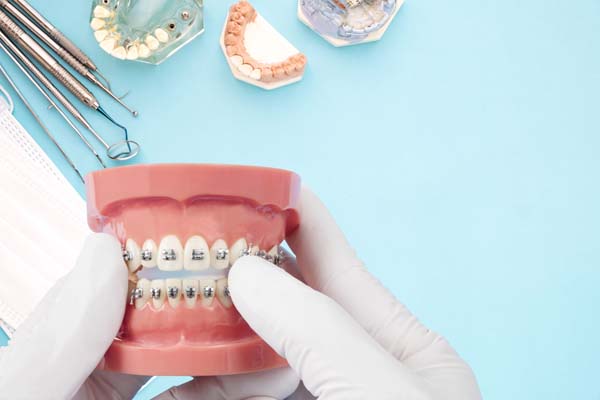Pros and Cons of Braces for Orthodontics

Braces have been used for orthodontics for over a century. They move teeth by applying force on them, slowly pushing them to a better alignment. Braces are made up of brackets that are attached to each tooth and wires that connect all the brackets on a dental arch. Increasing tension in these wires increases the force being applied to the patient’s teeth. Pushing teeth to a better alignment is the idea that powers orthodontics.
About braces
Braces are highly recommended by dentists when it comes to fixing severe bite issues. Treatment times are typically somewhere between one to three years. Braces are easily noticed when worn, however, and that makes some people reluctant to straighten their teeth with them.
Fortunately, more aesthetically pleasing options like ceramic braces have been developed. Ceramic braces have similar parts as metal braces, but the metallic components are replaced with transparent and tooth-colored parts. As a result, it is harder to notice them on teeth.
Pros and cons of orthodontics with braces
Most people think of braces when orthodontics is mentioned. The benefits of straightening teeth with braces include:
- Traditional braces can be used to treat a wider range of orthodontic issues than clear aligners, such as problems caused by a person’s jaw being improperly positioned
- Braces tend to lead to better outcomes compared to clear aligners
- Braces are typically more affordable than clear aligners
- Braces work 24/7, and that can lead to shorter treatment times
- Braces being non-removable can be a plus for the parents of children who need orthodontic treatment
- There is no way that a person can lose their braces
- Braces are more effective at straightening children’s teeth
- Ceramic braces provide decent aesthetics
- Braces are sturdier than clear aligners
However, there are downsides to fixing bite issues with braces. The most common ones include:
- Metal braces can ruin a person's smile
- People who wear braces often must avoid foods that need to be bitten into, like apples or corn, since this can lead to food particles getting stuck underneath the appliance or cause damage
- Braces being non-removable makes it harder to clean teeth and eat during treatment
- Treatment with braces typically requires monthly visits to a dentist
- Braces are more challenging to clean than clear aligners
Braces can get you a straight smile
Braces might not be the most aesthetically pleasing oral appliances used to straighten teeth, but they get the job done. Call or visit our Chicago clinic to learn more about how oral appliances like braces can be used to fix problems with your bite.
Request an appointment here: https://www.yourfamilysmiles.com or call Family Dental Care of Chicago at (773) 250-1194 for an appointment in our Chicago office.
Check out what others are saying about our dental services on Yelp: Orthodontics in Chicago, IL.
Recent Posts
A dental crown is used to restore teeth that are in bad shape. Oftentimes, they are needed for teeth that have become cracked, chipped or broken. Additionally, general dentists recommend them for teeth that have severely decayed due to an infection. While they are one of the most common dental restorations, many wonder how long…
You may be wondering what the difference is between a family dentist and a general dentist. Maybe you moved to a new town or you are choosing a dentist for the first time. Even though the two terms are used interchangeably, there is a difference between the two terms. Understanding them can help you make…
Denture adjustment is a necessary procedure that must be performed if your dentures no longer fit your mouth. Whether you have partial or complete dentures, these prompt your gums and soft tissues to adjust. Once the dentures have settled, they will also be likely to change over time. You may experience difficulty chewing or feel…
Using custom-fit plastic trays, Invisalign® treatments are a restorative and corrective treatment for several dental problems. As an orthodontic solution, clear aligners are often compared to a treatment using metal braces. Corrective measures typically address crooked or misaligned teeth, and provided the patient wears the trays for the prescribed length of time, the results are…


